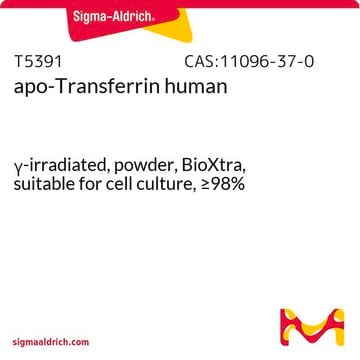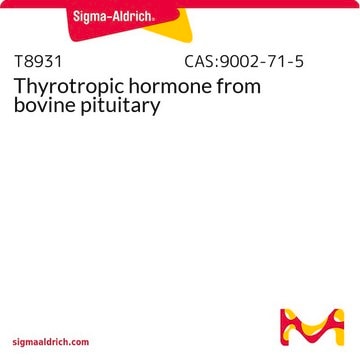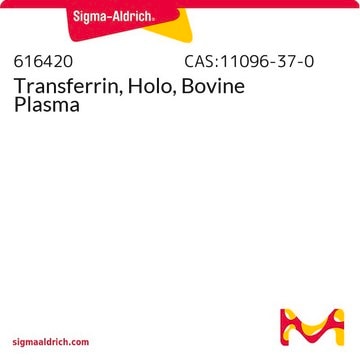T1428
apo-Transferrin bovine
BioReagent, suitable for cell culture, ≥98%
Synonym(s):
Human serotransferrin
Sign Into View Organizational & Contract Pricing
All Photos(5)
About This Item
Recommended Products
biological source
bovine
product line
BioReagent
Assay
≥98%
form
powder
technique(s)
cell culture | mammalian: suitable
impurities
iron, essentially free
solubility
H2O: 10 mg/mL
UniProt accession no.
storage temp.
2-8°C
Gene Information
bovine ... TF(280705)
Looking for similar products? Visit Product Comparison Guide
General description
apo-Transferrin is an iron-free form of transferrin that is present in circulation.
Application
All cells require iron for the proper uptake of oxygen from their environment. Transferrin, a protein isolated from serum, causes the uptake and transport of iron from culture medium to the cells. This allows proper oxygen uptake and also stimulates growth-related enzyme activity. Iron-saturated transferrin (holo transferrin) is continually recycled after releasing iron and becomes iron-deficient transferrin (apo-transferrin). Choosing which form to use depends upon the culture conditions. In media such as Dulbecco′s Modified Eagle′s Medium/Ham′s Nutrient Mixture F12 (DMEM/F12) that contain high levels of iron salt, using apo-transferrin is preferred.
apo-Transferrin bovine has been used as a component of:
- basal medium for culturing bovine mammary epithelial cells
- minimum essential medium α (MEM-α) for spermatogonial stem cells (SSCs) culture
- induction medium for mesenchymal stem cell culture
Biochem/physiol Actions
apo-Transferrin (apoTf) aids in preventing iron accumulation in tissues, especially in non-transfusion dependent β-thalassemia.
Storage Class Code
11 - Combustible Solids
WGK
WGK 3
Flash Point(F)
Not applicable
Flash Point(C)
Not applicable
Personal Protective Equipment
dust mask type N95 (US), Eyeshields, Gloves
Certificates of Analysis (COA)
Search for Certificates of Analysis (COA) by entering the products Lot/Batch Number. Lot and Batch Numbers can be found on a product’s label following the words ‘Lot’ or ‘Batch’.
Already Own This Product?
Find documentation for the products that you have recently purchased in the Document Library.
Customers Also Viewed
Keita Abe et al.
Zeitschrift fur Naturforschung. C, Journal of biosciences, 63(1-2), 154-156 (2008-04-05)
We have investigated the mechanism of manganese ion uptake by apo-transferrin using a capillary electrophoresis method, and obtained clear evidence that oxidation state +3 and the binuclear unit of a manganese chelate are essential factors for the facile uptake by
Einar Vargas-Bello-Pérez et al.
Animal nutrition (Zhongguo xu mu shou yi xue hui), 5(2), 202-208 (2019-06-14)
The objective of this study was to determine how cytosolic triacylglycerols (TAG) are stored in mammary cells and whether this depends on the individual chemical configuration of fatty acids (FA). This objective was accomplished by addition of different FA to
Monique P Gelderman et al.
Haematologica, 100(5), 611-622 (2015-01-27)
Intermediate beta-thalassemia has a broad spectrum of sequelae and affected subjects may require occasional blood transfusions over their lifetime to correct anemia. Iron overload in intermediate beta-thalassemia results from a paradoxical intestinal absorption, iron release from macrophages and hepatocytes, and
Shanshan Li et al.
Journal of animal science and biotechnology, 7, 44-44 (2016-08-06)
The objective of this study was to study how changing the ratio of Lys to Thr, Lys to His, and Lys to Val affects the expression of lipogenic genes and microRNA (miRNA) in bovine mammary epithelial cells. Triplicate cultures with
Jia Wang et al.
Stem cell research & therapy, 10(1), 227-227 (2019-07-31)
High temperature has a very adverse effect on mammalian spermatogenesis and eventually leads to sub- or infertility through either apoptosis or DNA damage. However, the direct effects of heat stress on the development of spermatogonial stem cells (SSCs) are still
Our team of scientists has experience in all areas of research including Life Science, Material Science, Chemical Synthesis, Chromatography, Analytical and many others.
Contact Technical Service











